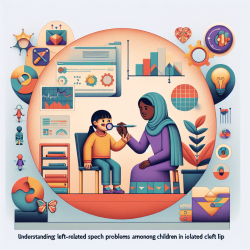In the dynamic field of special education, staying abreast of the latest research and integrating it into practice is crucial for delivering effective therapy services. Recent studies, such as the one on the measurement of centrality and pseudorapidity dependence of integrated elliptic flow in lead-lead collisions at high energies, offer insights that can be translated into practical strategies for therapists.
Understanding the Research
The study conducted by the ATLAS Collaboration at CERN provides a detailed analysis of particle behavior under extreme conditions. While this might seem distant from the realm of therapy, the methodologies and analytical techniques used can inspire new approaches to problem-solving and innovation in therapy settings.
Implementing Research Outcomes
Practitioners can draw parallels between the precision and systematic approach used in this research and their own practices. Here are some ways to implement these insights:
- Data-Driven Decisions: Just as researchers rely on precise data to draw conclusions, therapists can use data from assessments and progress monitoring to tailor interventions effectively.
- Collaborative Approaches: The collaborative nature of large-scale research projects like those at CERN highlights the importance of interdisciplinary collaboration in therapy settings to address complex cases.
- Continuous Learning: Engaging with current research encourages continuous professional development and helps therapists stay informed about new techniques and tools.
Addressing Therapist Staffing Shortages
One of the challenges in special education is managing therapist staffing shortages. By adopting efficient practices inspired by research methodologies, such as optimizing workflow and utilizing technology for remote consultations, schools can mitigate these challenges.
Ensuring Legal Compliance
Legal compliance is a cornerstone of special education services. The meticulous attention to detail observed in scientific research can be mirrored in maintaining thorough documentation and adherence to legal standards in therapy practices. Regular training sessions on compliance can ensure that all staff members are up-to-date with current regulations.
The Path Forward
To truly benefit from research like that conducted by the ATLAS Collaboration, practitioners should actively seek out opportunities for professional development through conferences, webinars, and publications. Networking with peers can also provide valuable insights and support.
For those interested in delving deeper into the original research paper that inspired these insights, please follow this link: Measurement of the centrality and pseudorapidity dependence of the integrated elliptic flow in lead–lead collisions at high energies.










